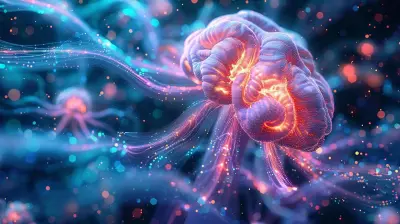Natural Ways to Treat Migraines and Improve Brain Function
2 July 2025
Let’s face it—migraines can be absolute monsters. One minute you’re going about your day, and the next, it feels like a tiny, angry drummer has taken up residence in your skull. If you’re nodding your head (gently, because ouch!), you’re definitely not alone. Migraines affect millions of people around the world and can turn a good day into a not-so-fun one in a heartbeat.
But here’s the good news: You don’t have to rely solely on medications to find relief. There are plenty of natural ways to treat migraines and give your brain function a lovely little boost while you’re at it. Sounds like a win-win, right?
In this article, we’re going to break it all down in a fun, easy-to-digest way—because migraines are serious, but your treatment doesn’t have to be a snoozefest.
What’s the Deal With Migraines?
Before we dive into remedies, let’s quickly chat about what migraines actually are. They're not your typical “oh, I have a headache” kind of pain. Migraines are full-blown, sensory-wrecking, brain-bending attacks that often come with nausea, sensitivity to light and sound, and sometimes even visual disturbances known as auras.They can last anywhere from a few hours to a few days. Yes, days! Imagine trying to function at work with your brain screaming "nope" every second—pretty rough.
And while experts aren’t entirely sure what causes migraines, they do know that brain chemistry, genetics, diet, stress, and even weather changes can play a role.
Natural Remedies That Actually Work
All right, let’s talk natural treatments. There’s no one-size-fits-all solution, but these options have helped many people reduce the intensity and frequency of their migraines. And hey, they might just help you too!1. Hydration: Your Brain's Best Friend
Migraines and dehydration go hand-in-hand more often than you'd think. Your brain is like a grumpy houseplant—it just needs a good watering sometimes.Try this: Carry a water bottle with you and aim for at least 8 cups of water a day. If water is too boring (understandable), add a splash of lemon or cucumber for flavor.
2. Magnesium: The Mighty Mineral
Magnesium deficiency has been linked to migraines. This powerhouse mineral helps regulate nerve function and blood sugar levels, both crucial for keeping migraines in check.Where to get it: Leafy greens, nuts, seeds, avocados, and even dark chocolate. And yes, I just told you to eat chocolate—you're welcome.
If you're not getting enough from food, talk to your doc about a magnesium supplement—absorbing it through an Epsom salt bath also helps.
3. Essential Oils: Tiny Bottles, Big Relief
Lavender and peppermint oils are two go-tos in the migraine world. Lavender calms the nervous system (and smells like a spa day), while peppermint has a cooling, pain-relieving effect.How to use: Rub a drop or two on your temples, or add to a diffuser and let the calming vibes roll in.
Heads up: Always test essential oils on a small patch of skin first—just in case.
4. Yoga and Meditation: Chill Your Brain Out
When stress levels spike, migraines often follow. That’s why calming your nervous system is a top-tier migraine defense.Yoga improves blood flow and reduces tension, while meditation helps you manage stress like a zen master.
Start small: Even just 10 minutes a day can make a difference. Apps like Headspace or Calm can walk you through it.
Bonus? Better mental clarity, improved focus, and an overall happier brain.
5. Get Some Shut-Eye (But Not Too Much)
Sleep is like a reset button for your brain. Too little or too much sleep can flip the migraine switch.Pro tip: Stick to a consistent sleep schedule. Go to bed and wake up at the same time—even on weekends. Yes, even after Netflix sucks you into that next episode.
Try keeping your bedroom cool, dark, and tech-free for better sleep quality.
Food as Fuel: Eat Smart for Your Brain and Head
Believe it or not, your diet can play a huge role in both migraines and brain function. Think of your brain as a high-performance car—it needs the right fuel to run smoothly.6. Avoid Common Migraine Trigger Foods
Not all foods are migraine-friendly. Some are known culprits:- Aged cheeses
- Processed meats
- Alcohol (especially red wine)
- Chocolate (sorry!)
- Caffeine (in excess)
- MSG and artificial sweeteners
Try tracking your food intake and noting when migraines occur—it might help you spot a pattern.
7. Brain-Boosting Foods to Stock Up On
Load up your plate with foods that support brain health and keep inflammation down (a major migraine trigger). Favorites include:- Fatty fish (hello, omega-3!)
- Berries (antioxidants for days)
- Nuts and seeds
- Whole grains
- Leafy greens
- Eggs (choline = memory support)
A colorful plate is a happy brain.
Lifestyle Habits That Make a Difference
Let’s be real—your daily habits can either boost your brain or bog it down. Tiny changes can lead to big improvements.8. Move Your Body
Exercise isn’t just for abs or fitting into jeans. It increases blood flow to the brain and helps knock down inflammation.Aim for: 30 minutes a day of something you enjoy. Walking, cycling, dancing in your living room—whatever gets you moving and smiling.
Just avoid intense workouts during a migraine—it’s about prevention, not punishment.
9. Limit Screen Time
Ever noticed that scrolling through your phone too long gives you a headache? Blue light and screen glare can be harsh on your noggin.Try this: Use blue light filters, take regular screen breaks (20-20-20 rule!), and blink often. Your eyes and brain will thank you.
Natural Brain Boosters (That Don’t Involve Caffeine)
If you're looking to feel sharper, more focused, and less foggy, there are natural ways to get there—no triple-shot espresso required.10. Adaptogens: Nature’s Little Helpers
Adaptogens are herbs that help your body adapt to stress. Some even support brain function and reduce migraine frequency.Popular picks:
- Ashwagandha (stress relief)
- Rhodiola (mental alertness)
- Ginkgo biloba (blood flow to the brain)
Always talk to your healthcare provider before trying new supplements, especially if you’re on medications.
11. Stay Mentally Active
Your brain loves challenges. Keep it busy in fun ways:- Crossword puzzles
- Learning a language
- Playing an instrument
- Reading (yep, health blogs count)
- Brain-training apps
Treat your brain like a muscle—the more you use it, the stronger it gets.
When to See a Doctor
Okay, real talk. Natural remedies are awesome, but if your migraines are frequent, severe, or just plain weird (like sudden changes in vision or speech), don’t tough it out. See a doctor. There might be an underlying condition at play, and a professional can help guide you in the right direction.Think of natural remedies as your supportive sidekicks—but let your doc be the superhero when needed.
Final Thoughts: Be Kind to Your Mind
At the end of the day, migraines are your body’s way of saying, “Hey, something’s off.” So instead of ignoring it, treat it like a message worth listening to. You don’t have to live at the mercy of your migraines—and you don’t have to wait for a pharmaceutical miracle either.Start small. Try one or two strategies from the list above. Be consistent. Be patient. And above all, be kind to yourself in the process.
Because your brain? It’s kind of a big deal—and it deserves all the love and care you can give it.
all images in this post were generated using AI tools
Category:
Brain HealthAuthor:

Angelo McGillivray
Discussion
rate this article
2 comments
Kyle Sharpe
Great tips! It's amazing how simple lifestyle changes can make such a difference for migraines and brain health. Thank you!
December 2, 2025 at 4:21 AM

Angelo McGillivray
Thank you for your kind words! I'm glad you found the tips helpful!
Molly McConkey
Great insights! Incorporating these natural remedies could significantly enhance both migraine relief and cognitive function. Looking forward to trying some of these tips!
July 12, 2025 at 3:38 AM

Angelo McGillivray
Thank you! I'm glad you found the insights helpful. Wishing you great success in trying the tips!


